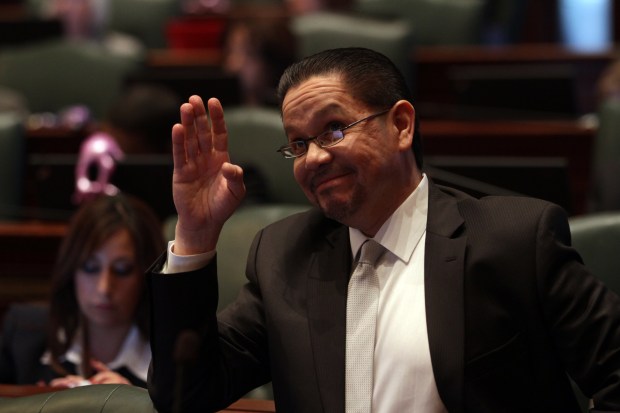The city of Chicago will receive $75 million to help offset security costs for this summer’s Democratic National Convention as part of a $460 billion spending measure President Joe Biden signed into law over the weekend to avert a government shutdown.
The approved federal funding represents a $25 million increase over what host cities for major parties’ nominating conventions have received in the past two decades. Milwaukee, which is hosting the Republican National Convention, also will receive $75 million to cover security costs.
A bipartisan group of lawmakers from Illinois and Wisconsin had been pushing for the 50% funding increase since last year. Biden is expected to accept the Democratic Party’s renomination at the DNC in August, while former President Donald Trump is expected to accept his third-straight GOP nomination in July at the Republican convention in Milwaukee.
Exactly how Chicago plans to spend its security dollars remains unclear, though the money can be used for everything from bomb-detecting technology to police overtime, according to the office of U.S. Rep. Mike Quigley, a Chicago Democrat who pushed for the funding increase.
“It is unrealistic to expect these conventions to run smoothly and peacefully while operating with funding levels from two decades ago,” Quigley said in a statement last week after the House approved the larger spending package. “With this year’s DNC happening in Chicago, I have been especially determined to ensure we have the capacity to respond to potential threats and provide law enforcement the necessary resources and support to do their jobs.”
Mayor Brandon Johnson’s administration said Monday it could not yet detail how it plans to spend the money.
“We are not able to provide a delineated budget, at this time, as it has not yet been approved by the (Department of Justice),” LaKesha Gage-Woodard, a spokeswoman for the city’s fiscal offices, said in a statement. “However, the grant will be used to cover personnel, operational and equipment costs related to ensuring the safety and security of the DNC this summer.”
DNC organizers welcomed the bipartisan funding boost.
“As a political entity, the (Democratic National Convention Committee) does not play a role in allocating this funding, but we will continue to work closely with our partners at the United States Secret Service and federal, state, and local law enforcement agencies to support their efforts to ensure a safe and successful convention,” DNCC spokeswoman Emily Soong said in a statement.
The Chicago police, the Secret Service and other law enforcement agencies already have been working for months on plans to secure convention events at both McCormick Place, where party business such as crafting the Democratic platform will be conducted, and the United Center, which will play host to the prime-time speeches and other made-for-TV events.
In the coming weeks, the Secret Service is expected to release maps showing the broader areas around McCormick Place and the United Center that will be subject to tighter security restrictions during the convention, which will run Aug. 19-22, officials said last week at a City Hall news conference.
More specific details, such as road closures and security checkpoint locations, won’t be released until closer to the convention.
The Secret Service is involved with security operations within the designated convention areas because presidential nominating conventions are among the large-scale gatherings designated as “National Special Security Events,” which also include Super Bowls and State of the Union addresses.
“None of this is new to Chicago,” Jeff Burnside, the Secret Service’s 2024 DNC coordinator, told reporters last week. “The city has a proven track record of managing large-scale events, whether it’s the downtown NASCAR race last summer, the annual Lollapalooza concert festival, the Bank of America Chicago Marathon or Taste of Chicago.”
But with the possibility of large-scale protests outside the designated security areas, Chicago police also are preparing for potential unrest in other parts of the city. City Hall already has denied multiple permit applications from groups planning to protest at the DNC.
Police Superintendent Larry Snelling said the department is looking to its playbook from the 2012 NATO Summit in Chicago, also a “National Special Security Event,” as a model for how to handle security surrounding this year’s DNC.
Snelling acknowledged that officers “had not been properly prepared” for the widespread protests and ensuing violence that broke out after the police killing of George Floyd in Minneapolis in 2020, when the Chicago Police Department’s response drew a strong rebuke from the city inspector general’s office.
“We’re training our officers for these large-scale protests, understanding the First Amendment, constitutional policing,” Snelling said. “Every single thing that we’re doing right now is rooted in constitutional police. But we’re also training officers how to respond when they see these levels of violence, when they see vandalism, when they see physical attacks on others. … Our officers will be able to respond.”




